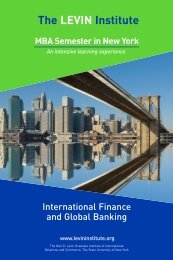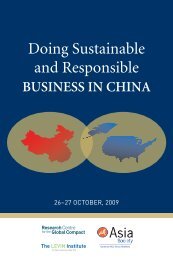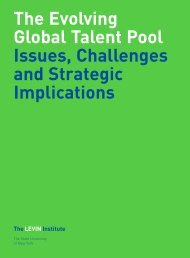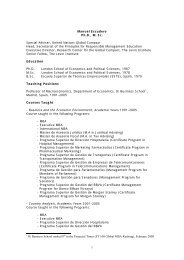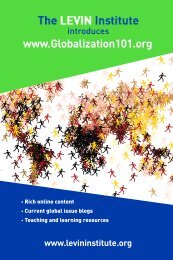The Evolving Global Talent Pool Lessons from the BRICS Countries
The Evolving Global Talent Pool Lessons from the BRICS Countries
The Evolving Global Talent Pool Lessons from the BRICS Countries
You also want an ePaper? Increase the reach of your titles
YUMPU automatically turns print PDFs into web optimized ePapers that Google loves.
3 In essence, <strong>the</strong> talent shortage is largely manifested in a shortage of<br />
qualified talent. Many of <strong>the</strong> HRST are not adequately educated for <strong>the</strong><br />
jobs that are available; at <strong>the</strong> same time, many of those with degrees in<br />
science and engineering are not employable in <strong>the</strong> areas of <strong>the</strong>ir training.<br />
4 <strong>The</strong> on-going talent shortage could become (and to some extent<br />
already has become) a significant obstacle to economic growth and<br />
<strong>the</strong> pursuit of innovation in emerging economies. And, as <strong>the</strong>se talent<br />
deficits become more severe, <strong>the</strong>y could serve to constrain <strong>the</strong> pace<br />
and thrust of global expansion among <strong>the</strong> world’s leading multinational<br />
corporations (MNCs).<br />
5 One of <strong>the</strong> major challenges associated with comparing <strong>the</strong> talent<br />
situation across <strong>the</strong> <strong>BRICS</strong> economies derives <strong>from</strong> <strong>the</strong> fact that talent<br />
definitions are different <strong>from</strong> country to country; this renders it difficult,<br />
if not impossible in some instances, to make direct comparisons across<br />
countries. Fur<strong>the</strong>r work on talent definition, granularity, and especially<br />
quality should be undertaken, perhaps involving organizations like <strong>the</strong><br />
World Bank, OECD, UNESCO and major international corporations, who<br />
would benefit <strong>from</strong> greater clarity.<br />
In summary, by ga<strong>the</strong>ring a broad array of hard-to-find information, <strong>the</strong><br />
<strong>Global</strong> <strong>Talent</strong> <strong>Pool</strong> project has achieved an important result in terms of<br />
yielding a detailed stocking of <strong>the</strong> technical talent present in <strong>the</strong> <strong>BRICS</strong><br />
countries. It has produced a series of useful comparisons particularly<br />
with regard to some of <strong>the</strong> problematic trends in supply and demand of<br />
technical talent. Moreover, taken toge<strong>the</strong>r, <strong>the</strong> studies have identified<br />
forward-looking trends that not only urge leadership in <strong>the</strong>se countries<br />
to take action to meet <strong>the</strong>ir talent needs, but also can assist policymakers<br />
in <strong>the</strong> U.S. and Western developed countries better appreciate<br />
<strong>the</strong>ir competitive challenges. Multinational corporations (MNCs) also<br />
should find <strong>the</strong> five studies useful individually and in aggregate in terms<br />
of designing and aligning <strong>the</strong>ir global strategies with current talent<br />
trends and conditions. It is clear <strong>from</strong> <strong>the</strong> studies that <strong>the</strong> “world is not<br />
yet flat” in talent terms—<strong>the</strong>re is more heterogeneity than homogeneity<br />
—and despite obvious increases in cross border collaboration and travel,<br />
in reality, <strong>the</strong>re is very limited talent mobility across borders.<br />
<strong>The</strong> project represents a positive first step in terms of alerting academic<br />
leaders, corporate executives, and policy makers that new levels of<br />
intervention may be needed to address evolving talent gaps within and<br />
across countries. While almost every nation has targeted <strong>the</strong> improvement<br />
of its S&T resource as part of its overall economic development<br />
strategy, fundamenal domestic education system reform may be<br />
required to respond to <strong>the</strong> significant misfits between talent demand<br />
and supply. More importantly, in particular, <strong>the</strong> business sector—both<br />
MNCs and local firms—shares a responsibility to invest both in <strong>the</strong>ir<br />
own employees and in <strong>the</strong> education systems of <strong>the</strong> countries in which<br />
<strong>the</strong>y do business. At <strong>the</strong> end of <strong>the</strong> day, it is this talent which can turn<br />
innovative ideas into competitive products, and a dynamic economy.<br />
<strong>The</strong> <strong>Evolving</strong> <strong>Global</strong> <strong>Talent</strong> <strong>Pool</strong><br />
ii



